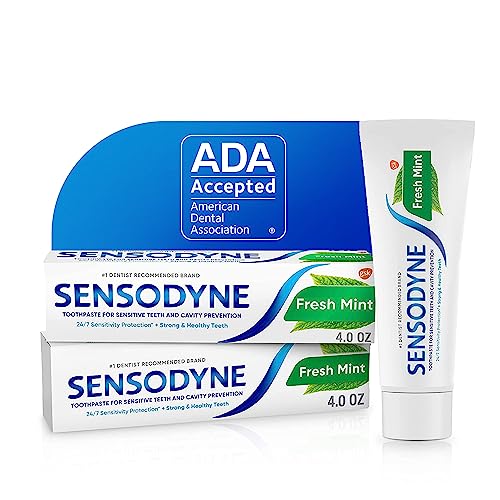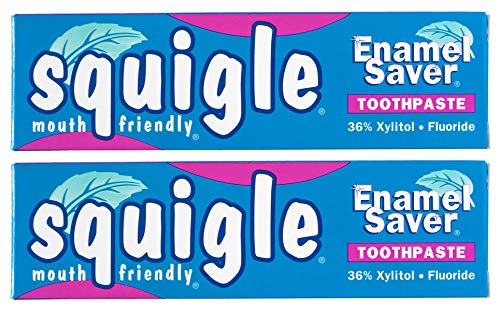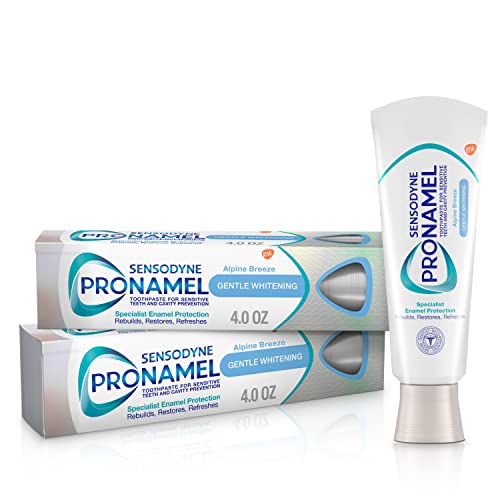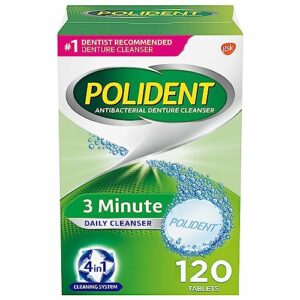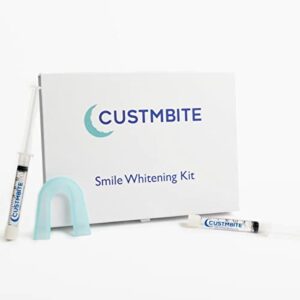In our step-by-step guide on “How to prevent tooth sensitivity from enamel erosion,” we aim to provide you with practical tips and strategies to protect your teeth from becoming sensitive due to enamel erosion. Enamel erosion, which is the wearing away of the outer layer of your teeth, can lead to heightened sensitivity and discomfort while eating or drinking. Our guide will walk you through various preventive measures you can take, such as maintaining good oral hygiene practices, avoiding acidic foods and beverages, using a soft-bristled toothbrush, and considering fluoride treatments. By following these steps, you can help safeguard your teeth and reduce the chances of experiencing tooth sensitivity.
Relief for Sensitive Teeth: Top Picks
Understanding Enamel Erosion
To understand enamel erosion, we need to know that it is the gradual wearing away of the protective outer layer of our teeth, called enamel. This erosion can be caused by various factors such as acidic foods and drinks, aggressive brushing, and certain medical conditions. When enamel erodes, it exposes the sensitive dentin layer underneath, which can lead to tooth sensitivity.
Avoid Acidic Foods and Drinks
To avoid acidic foods and drinks, we recommend steering clear of citrus fruits like oranges, grapefruits, and lemons, as well as sodas and vinegar-based dressings. These items are known to have high acidity levels, which can contribute to discomfort and acid reflux. Opting for alkaline alternatives such as bananas, melons, and herbal teas can help maintain a healthier digestive system.
Practice Good Oral Hygiene
Brushing twice a day with a soft-bristled toothbrush and using fluoride toothpaste is crucial for maintaining good oral hygiene. This simple routine helps to remove plaque and food particles from our teeth, preventing tooth decay and gum disease. By gently brushing in circular motions for at least two minutes, we can ensure that our teeth are thoroughly cleaned and protected against cavities. Remember to replace your toothbrush every three to four months to maintain its effectiveness.
Use a Desensitizing Toothpaste
To alleviate tooth sensitivity, we recommend using a desensitizing toothpaste. Here’s a step-by-step guide on how to use it effectively:
- Squeeze a pea-sized amount of desensitizing toothpaste onto a soft-bristled toothbrush.
- Gently brush your teeth, paying special attention to the areas where you experience sensitivity.
- Brush for at least two minutes, making sure to cover all surfaces of your teeth.
- Spit out the toothpaste and rinse your mouth thoroughly with water.
- It’s best to use the desensitizing toothpaste twice a day, in the morning and before bed, for optimal results.
Remember, consistency is key when using a desensitizing toothpaste. With regular use, you should start noticing a reduction in tooth sensitivity over time. If the sensitivity persists or worsens, it’s advisable to consult with your dentist for further evaluation and guidance.
Avoid Teeth Grinding
Teeth grinding can have a negative impact on your enamel, leading to tooth sensitivity and potential damage. To protect your teeth, we suggest using a mouthguard at night. A mouthguard acts as a cushion, preventing direct contact between your upper and lower teeth and minimizing the effects of grinding. To use a mouthguard, simply insert it over your upper teeth before going to bed, ensuring a comfortable fit.
Limit Acidic Beverages
To limit the consumption of acidic beverages, we encourage you to make healthier choices. Instead of reaching for those fizzy sodas or citrus juices, opt for water or herbal tea. These alternative options will not only quench your thirst but also help reduce the acidity in your diet.
Visit the Dentist Regularly
Regular dental check-ups are essential for maintaining good oral health. By visiting the dentist regularly, we can identify and address enamel erosion in its early stages. To ensure the health of our teeth and prevent further damage, we should schedule dental appointments at least twice a year.
Consider Dental Treatments
Consider seeking professional dental treatments such as dental sealants or fluoride treatments to effectively safeguard your enamel. These treatments are designed to provide an extra layer of protection for your teeth, helping to prevent tooth decay and strengthen your enamel against acid attacks. By scheduling an appointment with a dental professional, they can assess your specific needs and recommend the most suitable treatment option for you.
Protecting Your Dental Health
In conclusion, we have explored effective strategies to prevent tooth sensitivity caused by enamel erosion. By understanding the causes and taking preventative measures, such as maintaining good oral hygiene, avoiding acidic foods and drinks, and using a soft-bristled toothbrush, we can safeguard our enamel and reduce the risk of sensitivity. Remember, preserving the integrity of our enamel is crucial for a healthy and pain-free smile. Let’s make a commitment to prioritize our dental health and prevent tooth sensitivity.
Protecting Your Smile
Tips and Techniques for Managing Tooth Sensitivity
- First, it’s important to practice good oral hygiene by brushing your teeth twice a day with a soft-bristled toothbrush and fluoride toothpaste
- Avoid brushing your teeth too aggressively as this can wear down the enamel and lead to tooth sensitivity
- Use a toothpaste specifically formulated for sensitive teeth, as it will help to reduce sensitivity over time
- Limit your consumption of acidic and sugary foods and drinks, as they can contribute to tooth sensitivity
- Consider using a mouthguard at night if you grind your teeth, as grinding can cause tooth sensitivity
- If you experience tooth sensitivity, try using a desensitizing toothpaste or gel, which can provide temporary relief
- Visit your dentist regularly for check-ups and professional cleanings, as they can identify and address any underlying issues that may be causing tooth sensitivity
Taking Steps to Reduce Tooth Sensitivity
When should we seek professional dental help for tooth sensitivity, and what treatment options are available?
If you are experiencing tooth sensitivity, it is important to know when to seek professional dental help and what treatment options are available. Tooth sensitivity can be caused by various factors such as tooth decay, gum recession, enamel erosion, or tooth grinding.
If you are experiencing persistent or severe tooth sensitivity, it is advisable to seek professional dental help. Additionally, if the sensitivity is affecting your daily activities, causing pain or discomfort, or if you notice any other concerning symptoms, it is best to consult a dentist.
A dental professional can evaluate the underlying cause of your tooth sensitivity and recommend appropriate treatment options. These may include:
- Desensitizing toothpaste: Your dentist may suggest using a desensitizing toothpaste that contains compounds to help alleviate sensitivity.
- Fluoride treatment: Fluoride can help strengthen the enamel and reduce sensitivity. Your dentist may apply fluoride gel or varnish to the affected teeth.
- Dental restorations: If tooth decay or enamel erosion is the cause of sensitivity, your dentist may recommend dental fillings, dental bonding, or dental crowns to restore and protect the affected teeth.
- Gum grafting: In cases where gum recession is causing sensitivity, a gum grafting procedure may be necessary. This involves taking tissue from another area of your mouth and attaching it to the exposed root surfaces to cover them.
- Root canal treatment: If the sensitivity is due to an underlying infection or damage to the tooth nerve, your dentist may recommend root canal treatment to remove the damaged tissue and alleviate the sensitivity.
What role does enamel erosion play in tooth sensitivity, and how can we prevent it?
Enamel erosion plays a significant role in tooth sensitivity, and we understand how bothersome it can be. When the protective layer of enamel on our teeth wears down, it exposes the underlying dentin. Dentin contains tiny tubules that connect to the nerves in our teeth, making them more sensitive to external factors like hot, cold, or sweet foods and drinks.
To prevent enamel erosion and reduce tooth sensitivity, we can follow a few helpful tips. Firstly, we should be mindful of our diet and limit our consumption of acidic foods and drinks such as citrus fruits, sodas, and vinegar-based dressings. When we do indulge in them, it’s best to rinse our mouths with water afterward to help neutralize the acids.
Additionally, we should avoid brushing our teeth immediately after consuming acidic foods or beverages, as the enamel becomes temporarily softened and more susceptible to damage. Instead, we can wait for at least 30 minutes before brushing, allowing our saliva to naturally remineralize the enamel.
Using a soft-bristled toothbrush and applying gentle pressure while brushing is essential to minimize enamel abrasion. Also, it’s recommended to use fluoride toothpaste to strengthen the enamel and reduce tooth sensitivity.
Furthermore, we should avoid habits that contribute to enamel erosion, such as teeth grinding or clenching. If we do have these habits, wearing a mouthguard at night can help protect our teeth.
Regular dental check-ups are crucial to detect early signs of enamel erosion and receive appropriate treatment. Our dentist may recommend applying a protective dental varnish or fluoride treatment to strengthen the enamel and reduce sensitivity.
By following these preventive measures, we can take good care of our enamel, reduce tooth sensitivity, and maintain a healthy, pain-free smile.
What are the common causes of tooth sensitivity?
Tooth sensitivity can be caused by various factors, which we will outline for you. One common cause is exposed dentin, which occurs when the protective layer of enamel on the outside of the tooth wears down or is damaged. This exposes the dentin, a sensitive layer of tissue that contains microscopic tubules leading to the tooth’s nerve endings. When hot, cold, sweet, or acidic substances come into contact with the dentin, it can trigger discomfort or pain.
Another cause of tooth sensitivity is gum recession. When the gums recede or pull away from the tooth, the tooth roots become exposed. These roots do not have the same protective enamel as the crowns of the teeth, making them more susceptible to sensitivity.
Tooth decay or cavities can also lead to sensitivity. If a cavity forms and progresses, it can reach the inner layers of the tooth, including the dentin, causing sensitivity when eating or drinking.
Grinding or clenching the teeth, known as bruxism, can wear down the enamel and expose the dentin, leading to sensitivity. Additionally, using a toothbrush with hard bristles or brushing too aggressively can erode the enamel, making the teeth more sensitive.
Certain dental procedures, such as teeth whitening, dental cleanings, or restorative work like fillings or crowns, can temporarily cause tooth sensitivity. This sensitivity usually subsides on its own after a short period of time.
Lastly, some individuals may experience tooth sensitivity due to factors beyond their control, such as genetics or age. As we age, our gums naturally recede, exposing more of the tooth roots and increasing the likelihood of sensitivity.
If you are experiencing tooth sensitivity, we recommend consulting with a dental professional who can assess your specific situation and provide appropriate treatment options.


